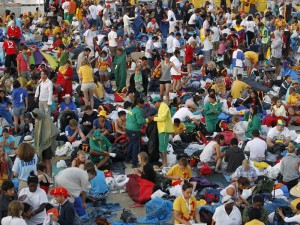
WHERE ARE THE FILIPINOS? In this Associated Press file photo, worshippers wake up at the Cuatro Vientos airfield, outside Madrid, waiting for the arrival of Pope Benedict XVI to celebrate mass Sunday Aug. 21, 2011. The Pope went to Madrid for a four-day visit to celebrate the church’s World Youth Day.
MANILA, Philippines — This time, the Catholic Bishops’ Conference of the Philippines (CBCP) is not too worried about Filipino pilgrims of the World Youth Day in Brazil going TNT (tago ng tago or “always hiding”).
At a church forum, Legazpi Bishop Joel Baylon said Filipino participants would not likely become illegal immigrants in Brazil due to the ongoing civil unrest happening there over corruption and poor public services.
“We feel from the experience that we had from before, that the chance of people staying and going TNT in Brazil is very small,” said Baylon, head of the CBCP Episcopal Commission on Youth at a church forum hosted by the Catholic Media Network in Intramuros, Manila.
TNT is a local term that refers to Filipinos who stay overseas without proper documentation and keep hiding from authorities to avoid deportation.
“While [Brazil] is one of the more aggressive and improved economies, they are also going through difficulties,” he pointed out.
The prelate was referring to reports of small violent street protests in several Brazilian cities to demand for better government services and institutional reform. Analysts have anticipated that mass protests jolting the country may continue even during the visit of Pope Francis later this month.
“In fact, we are praying and we are also asking for your prayers that our delegation won’t encounter unnecessary tension with regard to this unrest happening because the people there are disappointed with the way the government is running itself,” said Baylon.
He said, this, among many other factors, would turn off Filipino pilgrims about overstaying in Brazil after the 27th World Youth Day, the largest Catholic event that was first initiated by Blessed Pope John Paul II in 1985.
The event will be held in Rio De Janeiro, the second largest city of Brazil, from July 23 to 28. The Philippine delegation under the CBCP will have 270 participants, mostly the youth and some 20 priests.
Besides, only one or two delegates have relatives in Brazil, according to Baylon.
He recalled that during the World Youth Day in Sydney, Australia in 2008, some also attempted to stay behind.
“But after several weeks they came back (to the Philippines) because Australia is a water-bound continent. You can’t go anywhere and the chance of finding work there as an illegal alien was very small,” recounted Baylon.
During the World Youth Day celebrations held in Germany in 2005 and in Canada in 2002, some Filipino delegates did not return home.
In 2011, the CBCP appealed to the Filipinos who attended the festival in Madrid, Spain, to return home so as not to hurt the local Church’s relations with the Spanish embassy in Manila.